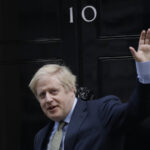First, it was about blowing up a dam, now it’s about unleashing a “dirty bomb.”
A sudden flurry of Russian accusations about supposed Ukrainian plans has fueled new Western fears that President Vladimir Putin might be planning his own escalation to change the course of a war that reached eight months Monday and has not been going his way.
Putin’s embattled defense chief was busy this weekend making phone calls to Kyiv’s closest allies to voice Moscow’s latest evidence-free allegations.
Sergei Shoigu warned defense officials in France, Turkey, Britain and the United States that Ukraine was preparing a provocation and the use of what he termed a “dirty bomb.” The situation is steadily trending toward “a further, uncontrolled escalation,” he warned in one of the calls without elaborating.
It comes after Russia’s new chief commander in Ukraine warned last week that Kyiv could resort to “prohibited methods of war” as Russia faces a retreat in the southern region of Kherson after a slew of humiliating military setbacks. Gen. Sergei Surovikin specifically warned that Ukraine was preparing to attack a key dam in the region, threatening to flood the area.
But Ukraine and its allies have vociferously rejected the Russian accusations, countering that, in fact, the Kremlin’s public claims suggest it is seeking to build a pretext for an escalation, and may be planning a “false flag” operation in which it blames Kyiv for its own actions.
Military analysts said that while concerning, the Russian claims were more likely a desperate attempt to convince the West it was willing to resort to such a drastic step than a sign it was actually planning one.
“This is classic Russian ‘vranyo’ — a lie that I know you don’t believe, and I don’t believe it either. We both know that. But this is my story and I’m sticking to it,” Michael Clarke, a professor of war studies at King’s College London, told NBC News. “So it’s a clumsy double bluff,” he said, “trying to make the West frightened of pushing Moscow too hard.”


Nevertheless, it drew coordinated public pushback from the U.S. and its allies.
In a joint statement early Monday, the U.S., Britain and France rejected Shoigu’s accusations and “any pretext for escalation by Russia.” Separately, Secretary of State Antony Blinken called the allegations “transparently false.”
Kremlin spokesman Dmitry Peskov countered those statements Monday, saying the threat of a “dirty bomb” was “obvious,” irrespective of the doubts of Kyiv’s allies. In a lengthy update Monday, the Russian Defense Ministry said Ukraine had the scientific, technological and industrial capability to create a “dirty bomb” to further discredit Russia globally.
Ukrainian President Volodymyr Zelenskyy also denied Shoigu’s claims in a video address Sunday, adding that Shoigu’s “telephone carousel” with Kyiv’s allies was not very convincing.
“If Russia calls and says that Ukraine is allegedly preparing something, it means one thing: Russia has already prepared it,” he said.
Kyiv on Monday said Russia was engaging in “nuclear blackmail,” adding that it was open to monitoring missions.
The Kremlin has an established pattern of warning about so-called “false flag” operations by Ukraine and its allies.
The U.S. said in January that Russia was engaging in such a scheme in eastern Ukraine to try and justify a full-scale invasion. Moscow did just that in the buildup to its Feb. 24 assault, and has subsequently accused Ukraine and its allies of planning biological and nuclear provocations in order to blame Russia.
Moscow’s latest accusations offered few specifics. But broadly, a “dirty bomb” can be defined as a conventional explosive with added radiological material, according to the Washington-based Center for Arms Control and Non-Proliferation. Its deployment could threaten tens of thousands of people and contaminate the affected area for up to 50 years, a Russian nuclear official was quoted as saying by the state news agency Tass on Monday. NBC News could not verify the claims.
Some analysts picked up on Shoigu’s rush of calls as a potentially troubling sign.


“We’ve seen nothing like this intense military diplomacy since war began. Its substance is even more worrying,” Nigel Gould-Davies, a senior fellow for Russia and Eurasia at the International Institute for Strategic Studies, said in a series of tweets.
The calls could either be Shoigu doubling down on Putin’s bluffs, he said, or preparing the way for Russian nuclear use.
Russia is facing a “logic of dwindling choices as it loses,” Gould-Davies added, making escalation “of all kinds” more likely.
However, the Institute for the Study of War, a U.S.-based military think tank, said in its assessment Sunday that Shoigu’s round of “scare-mongering” calls was likely further Russian saber-rattling aimed at intimidating Kyiv’s Western allies into cutting or limiting their support for Ukraine and widening fissures within NATO — not setting conditions for imminent nuclear use.
Clarke of King’s College London said the accusations betray the Kremlin’s despair after months of battlefield setbacks and nuclear threats that appear to have produced little change in Western approach.
“The crudity of the maneuver looks like increasing desperation to me,” he said. “The Kremlin has been making dark nuclear threats from the beginning and they are not having much effect on Western policy.”


Aided by Western weapons, Ukraine’s military has Russian forces on the back foot in the east and the south.
Moscow-installed officials have been evacuating civilians from the strategic and symbolic jewel of Kherson, urging residents to flee the city and parts of the broader region because Kyiv’s troops are preparing attacks that, they say, include blowing up a nearby hydroelectric dam. Zelenskyy said last week that Russian forces had in fact mined the dam, and that the result of a blast would be “catastrophic.”
“I think the dam is the same process — they are ‘thinking about it’ and want us to worry,” Clarke said. “But the dam is a bit more possible than a radiological event, insofar as Surovikin is brutal enough to do it as a tactical move to give his withdrawing troops a flood barrier to get behind.”
This article was originally published on NBCNews.com




